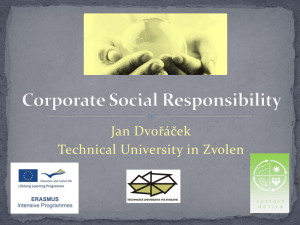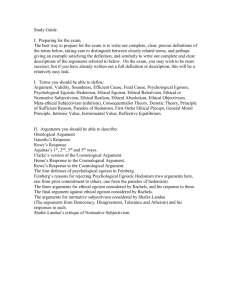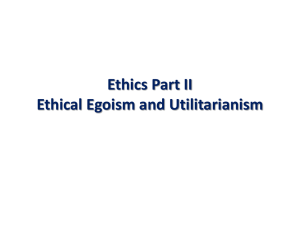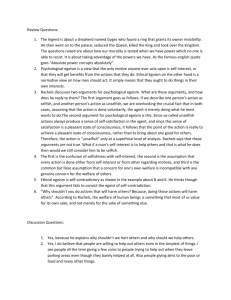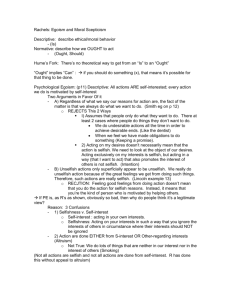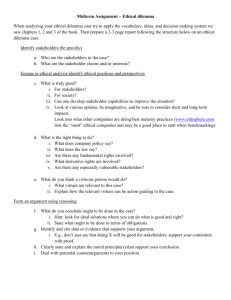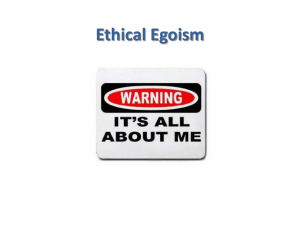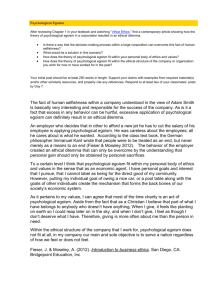Ethical Egoism
advertisement
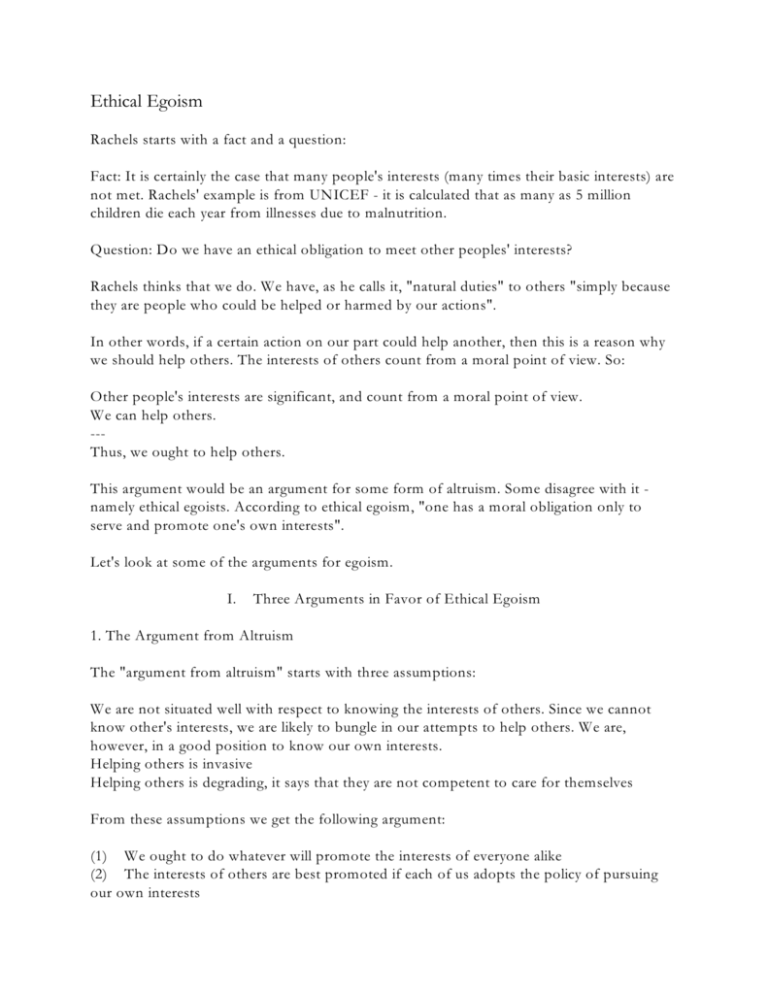
Ethical Egoism Rachels starts with a fact and a question: Fact: It is certainly the case that many people's interests (many times their basic interests) are not met. Rachels' example is from UNICEF - it is calculated that as many as 5 million children die each year from illnesses due to malnutrition. Question: Do we have an ethical obligation to meet other peoples' interests? Rachels thinks that we do. We have, as he calls it, "natural duties" to others "simply because they are people who could be helped or harmed by our actions". In other words, if a certain action on our part could help another, then this is a reason why we should help others. The interests of others count from a moral point of view. So: Other people's interests are significant, and count from a moral point of view. We can help others. --Thus, we ought to help others. This argument would be an argument for some form of altruism. Some disagree with it namely ethical egoists. According to ethical egoism, "one has a moral obligation only to serve and promote one's own interests". Let's look at some of the arguments for egoism. I. Three Arguments in Favor of Ethical Egoism 1. The Argument from Altruism The "argument from altruism" starts with three assumptions: We are not situated well with respect to knowing the interests of others. Since we cannot know other's interests, we are likely to bungle in our attempts to help others. We are, however, in a good position to know our own interests. Helping others is invasive Helping others is degrading, it says that they are not competent to care for themselves From these assumptions we get the following argument: (1) We ought to do whatever will promote the interests of everyone alike (2) The interests of others are best promoted if each of us adopts the policy of pursuing our own interests ---(3) Thus, each of us should adopt the policy of pursuing our own interests exclusively Rachel's response is simple. The above argument is not an egoistic argument -- it is actually an altruistic one. Notice that although the conclusion says that we ought to act egoistically, the conclusion is driven by the motivation of altruism (in premise 1). So it basically says "in order to be successfully altruistic, everyone ought to act as an egoist". Obviously, this doesn't work as an argument for egoism. 2. Ayn Rand's Argument (1) Each individual has intrinsic and supreme worth (projects, plans) (2) The ethics of altruism regards the life of an individual as something which must be readily sacrificed for others (3) Thus, the ethics of altruism does not take seriously the value of the individual (4) Ethical egoism does take the human being's individuality seriously, and is the only philosophy that does so (5) Thus Ethical Egoism is the philosophy that ought to be accepted Rachels' argument: Rand is too extreme. She paints us a "false dilemma". In other words, she points to two alternatives -- extreme egoism or extreme altruism -- and then shows how no one would accept extreme altruism, and then concludes that egoism must therefore be true. Rachels says there can be a third option -- can't it be the case that a person balance out the needs of others with the needs of oneself? According to Rand, this is not possible. 3. Thomas Hobbes' Argument Common-sense moral intuitions can always be explained in terms of ethical egoism. We ought to do certain things (like tell the truth, don't kill, etc) because in the long run they serve our interests. Examples: a. If we make a habit of harming others, people will be reluctant to help us, or refrain from harming us. Thus it is in our own interests not to harm others. b. If we lie to people, we will get a bad reputation. We need people to be honest with us. Thus it is in our own best interests to be truthful c. It is to our advantage to enter into mutually beneficial arrangements with people. Therefore we ought to keep our promises. So Hobbes argument looks something like this: (1) If it serves my own interests to adopt some "altruistic principles", then I ought to adopt some altruistic principles. (2) It serves my own interests (as in a, b, and c above) to adopt some "altruistic principles". --(3) Thus, I ought to adopt some altruistic principles Notice that Hobbes' argument is the reverse of the "argument from altruism" (above). We start with egoistic motivations and goals, and end up acting like altruists (that doesn't mean, as Hobbes argues, that we are altruists!). Rachels two objections: (1) (2) some particular cases of telling the truth or keeping promises can harm us There could be other reasons why a person is helping others besides egoism II. Three Arguments Against Egoism 1. Baier's Conflict Argument B and K (see the story in the book) are both forced by ethical egoism to thwart each other in their duty. But this means that for an ethical egoist, ethics does not (necessarily) resolve conflicts as it should. Therefore, according to Baier, ethical egoism must be false since there are some moral situations where conflict cannot be resolved. Rachels' response: ethical egoism need not accept that morality resolve conflicts. It may believe that all agents are in essential conflict, and so "the best person" wins. 2. Baier's Inconsistency Argument Consider this argument: (a) (b) (c) (d) (e) (f) their (g) --(h) B's duty is to thwart K. K's duty is to not be thwarted. It is right for B to thwart K It is wrong to prevent someone from doing their duty If B succeeds, then his act is right, since it is his duty to thwart K If B succeeds, then his act is wrong, since it is wrong to prevent someone from doing duty B's act is both right and wrong at once Thus, Ethical Egoism is logically inconsistent Rachels response: the argument requires that we believe that "it is wrong to prevent someone from doing their duty". Rather, it would only be wrong if it were not in that person's best interests! 3. The Argument from Privileged Interests Why doesn't racism work? It doesn't work because it claims that one groups' interest are more important than another's but yet fails to be able to show that the one group has properties which are salient in the sense of proving that they are more important. Now what about egoism? It requires that we believe that from each person's perspective, their own interests are more important than everyone else's. If this is so, we must be able to come up with some salient differences between the self and others to ground it. Otherwise, it is no different than racism.
